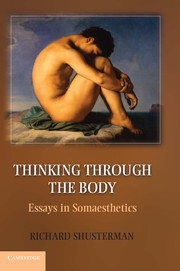Book contents
- Frontmatter
- Contents
- Preface
- Introduction
- Part I Somatic Being, Knowing, and Teaching
- 1 Thinking through the Body
- 2 The Body as Background
- 3 Self-Knowledge and Its Discontents
- 4 Muscle Memory and the Somaesthetic Pathologies of Everyday Life
- 5 Somaesthetics in the Philosophy Classroom
- Part II Somaesthetics, Aesthetics, and Culture
- Part III The Arts and the Art of Living
- Select Bibliography
- Index
- References
1 - Thinking through the Body
Educating for the Humanities
Published online by Cambridge University Press: 05 November 2012
- Frontmatter
- Contents
- Preface
- Introduction
- Part I Somatic Being, Knowing, and Teaching
- 1 Thinking through the Body
- 2 The Body as Background
- 3 Self-Knowledge and Its Discontents
- 4 Muscle Memory and the Somaesthetic Pathologies of Everyday Life
- 5 Somaesthetics in the Philosophy Classroom
- Part II Somaesthetics, Aesthetics, and Culture
- Part III The Arts and the Art of Living
- Select Bibliography
- Index
- References
Summary
I
What are the humanities and how should they be cultivated? With respect to this crucial question, opinions differ as to how widely the humanities should be construed and pursued. Initially connoting the study of Greek and Roman classics, the concept now more generally covers arts and letters, history, and philosophy. But does it also include the social sciences, which are often distinguished from the humanities and grouped as a separate academic division with greater pretensions to scientific status? And should our pursuit of humanistic study be concentrated on the traditional methods and topics of high culture that give the humanities an authoritative aura of established nobility, or should it extend to new and funkier forms of interdisciplinary research such as popular culture or race and gender studies?
Despite such questions and controversy, it is clear (even from etymology) that the meaning of the humanities essentially relates to our human condition and our efforts to perfect our humanity and its expression. But what, then, does it mean to be human? I cannot pretend here to adequately answer such a complexly difficult question. I will, however, argue that because the body is an essential and valuable dimension of our humanity, it should be recognized as a crucial topic of humanistic study and experiential learning. Although the truth of this thesis should be obvious, it goes sharply against the grain of our traditional understanding of the humanities. One striking example of such anti-somatic bias is the very term that German speakers use to designate the humanities – Geisteswissenschaften – whose literal English translation would be “spiritual (or mental) sciences,” in contrast to the natural sciences – Naturwissenschaften – which treat physical life (with which, of course, the body is clearly linked). Hence, given the pervasive physical/spiritual opposition, the body is essentially omitted or marginalized in our conception of humanistic studies.
- Type
- Chapter
- Information
- Thinking through the BodyEssays in Somaesthetics, pp. 25 - 46Publisher: Cambridge University PressPrint publication year: 2012



